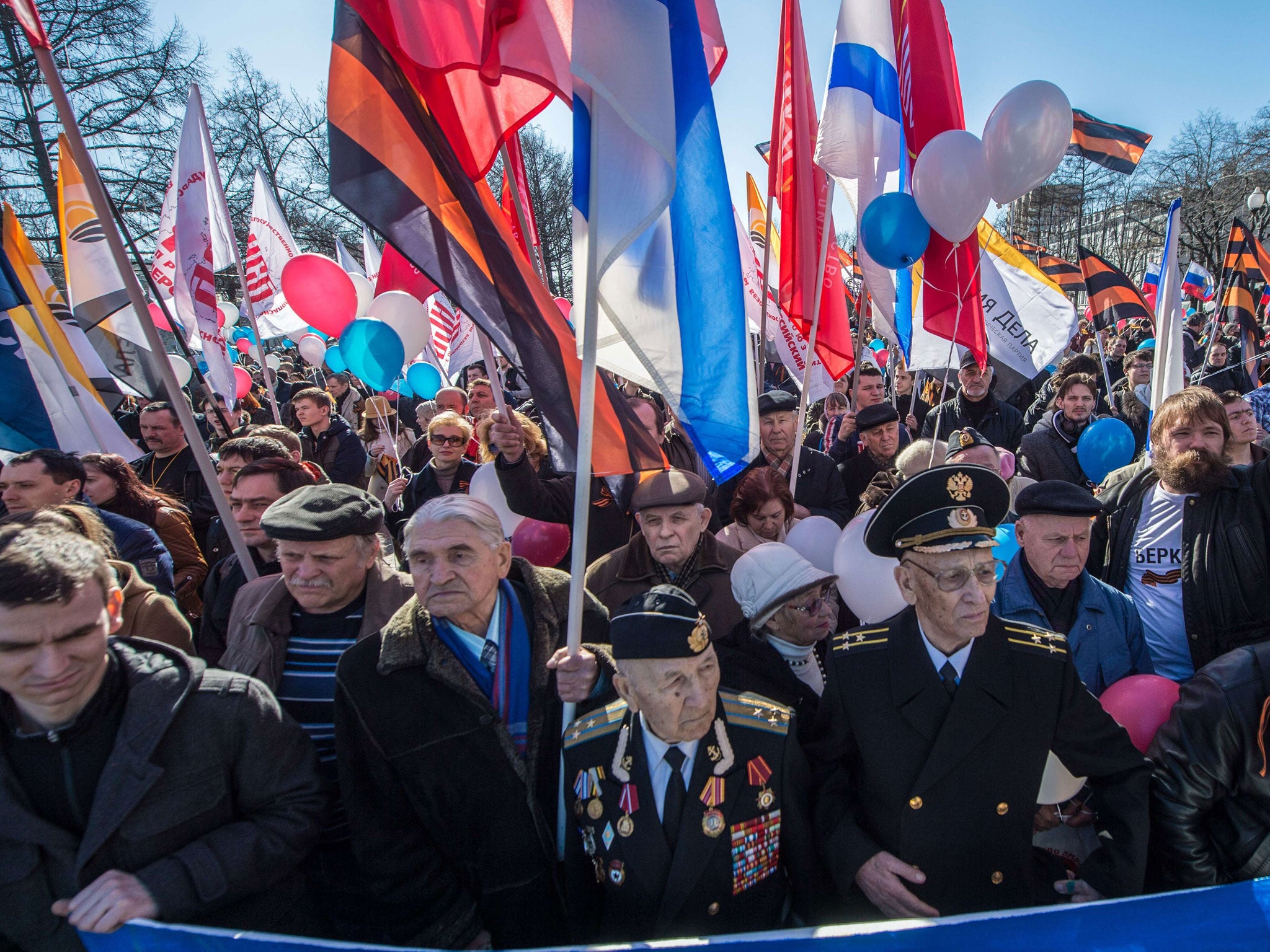Crimea crisis: With no orders from Kiev, Ukraine's besieged forces are starting to feel let down
The Ukrainian troops’ bravery earned the respect of the Russians. But now cracks are appearing.

The headquarters were surrounded again, by a far larger contingent than before. Some of the separatists wore mismatched uniforms and carried Kalashnikovs; all wore the red, white and blue emblem of the newly formed Crimean army bearing the motto “Prosperity Lies in Unity”.
But it is the spectre of division that is haunting the Ukrainian military here as Crimea prepares to break away and come under the rule of the Kremlin. At least a few of those laying siege to the most important operational base in the state capital, Simferopol, are former Ukrainian personnel who defected to the separatist side.
The forces of the Ukrainian government have, so far, shown astonishing bravery and resilience against far larger and better armed Russian troops. They have also resisted intimidation from the strutting "Self Defence Guards", or Soma Barona, of Russian nationalists. But now a slow trickle of soldiers has begun to change sides; and one reason for them doing so is the feeling that they have been abandoned by Kiev.
The government there, the complaint goes, has been only too ready with tough words; but that is as far as it goes.
In pictures: Ukraine crisis
Show all 12One of the enduring images of defiance against Moscow's might was that of Colonel Yuli Mamchuk marching his men up the hill at Belbek airbase to demand the return of facilities seized. They kept going forward, unarmed, singing the national anthem, after the Russians fired warning shots.
The example has been followed across the state; other bases have refused to surrender, remaining awkward thorns as the Kremlin closes its fist over Crimea. In a remarkable display of sangfroid, the Ukrainians, more often aviation technicians than soldiers, played football as the Russians, including Spetznatz special forces, posted marksmen and brought up armoured personnel carriers.
But, as the redoubtable Colonel Mamchuk continued negotiations, facing yet another threat of attack unless he surrendered the part of the base he still held, something happened which illustrated that they could expect no practical support in their stance. A call came on his mobile telephone. It was one of the senior officials in Kiev. What were the instructions? "They just kept asking me to use my own initiative. That has been the case ever since the Russians arrived here. So we really are on our own here," the Colonel told me.
The initiative shown by individual Ukrainian commanders has kept a string of strategic locations out of Russian hands, sometimes earning them the respect of their opponents. The base at Bakhchisarai was one of those holding out. It is in a sensitive place, with a large population of Tatars, a community adamantly opposed to Moscow. After a week of trying to persuade Colonel Vladimir Dokychaev to disarm and depart, the Russians left, with a contingent of Soma Barona staying to man a checkpoint. What were their parting words? "They said they were proud of us, they said we are the kind of soldiers the new Crimean army needs," the Colonel told me. "I said the problem was that the new Crimean army would be run by you Russians, but we happen to be soldiers of Ukraine."
What advice had he received from Kiev? "Very little," was the terse reply. As I write this, news is coming through that a senior officer at Bakhchisarai has disappeared. Defected? Kidnapped by nationalists? We are trying to find out.
Crimea's separatist government, led by Sergei Aksyonov, has declared, after voting for rule by Moscow, that the only legitimate forces here are the Russians, and the Ukrainian military must either join the new Crimean forces under Russian command, or return to "their homes in Ukraine".
At the Simferopol headquarters, Captain Ina Katsonova described how "they tried bribery, higher salary, free flats" as inducements to join the new Crimean forces. "I told them that I am not prepared to sell my country. We are Ukrainians and we will stay with our command."
The officer commanding the headquarters, Maj-Gen Igor Vorunchenko, was blunt: "I served in the old Soviet army and I know some of the Russian officers who are here now: I like some of them. But I have no intention of joining them, nor are we going to any other part of Ukraine without orders from my superiors in Kiev."
What orders did he receive? We do not know because the "Crimean" troops now in place outside insisted this morning that their own orders, from the Crimean government, were to bar entry.
We later arranged a meeting with one of these soldiers. He met us in civilian clothes, at the home of a friend. Leonid, a 26-year-old sergeant, had decided to change allegiance, he said, after a lot of soul searching, and remained troubled by what he had done.
"I cannot see how the situation can change," he said. "Crimea will become a part of the Russian Federation. We as soldiers were not allowed to do anything; we were without direction. What is this government in Kiev doing? Nothing for us. We got no help from them. At the end, what choice do we have but to join the new army? We were let down, weren't we?"
Subscribe to Independent Premium to bookmark this article
Want to bookmark your favourite articles and stories to read or reference later? Start your Independent Premium subscription today.

Join our commenting forum
Join thought-provoking conversations, follow other Independent readers and see their replies